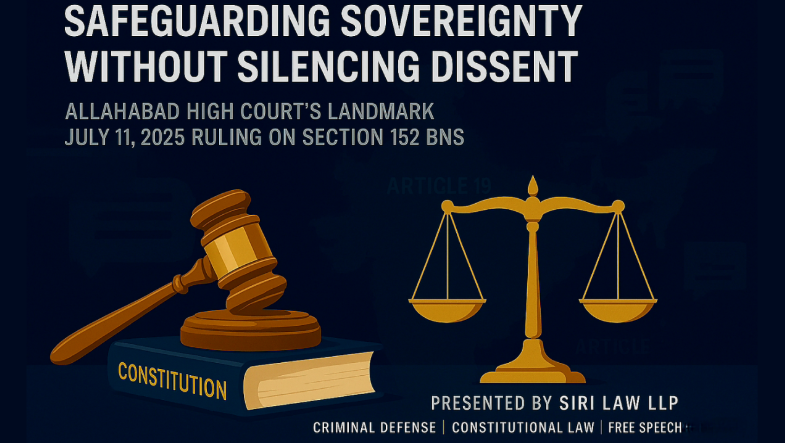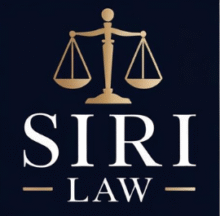
July 11, 2025
The interpretation and application of laws concerning national sovereignty are among the most sensitive and scrutinized functions of the judiciary. On 11 July 2025, the Allahabad High Court delivered a significant judgment that recalibrates the enforcement of Section 152 of the Bharatiya Nyaya Sanhita (BNS)-a provision that criminalizes acts that endanger the sovereignty, unity, and integrity of India.
In its ruling, the Court emphasized the need for reasonable care, judicial restraint, and contextual analysis before invoking such serious charges. The decision holds profound implications for criminal law, constitutional protections, free expression, and the evolving jurisprudence of national security in India.
Understanding Section 152 BNS in Context
Section 152 of the BNS represents the Indian legislature’s attempt to modernize and codify provisions akin to Section 124A of the Indian Penal Code (IPC), which previously dealt with sedition. The intent behind this new section is to criminalize activities that genuinely pose a threat to national integrity, such as incitement to violence, anti-state conspiracies, or organized subversive propaganda.
However, the ambiguity in language and breadth of potential interpretation has made this provision vulnerable to misuse. There have been instances where mere statements of opinion, symbolic support for foreign entities, or ideological expression have been treated as offences under this section-often without clear evidence of intent or consequence.
The Allahabad High Court’s ruling sets a necessary precedent against such overreach.
The Judgment: Key Highlights
In the case before the Court, an individual had allegedly expressed support for Pakistan in a private setting, without any reference to specific incidents, organizations, or calls to action. Authorities attempted to frame this under Section 152 BNS as a threat to Indian sovereignty.
The High Court, in a strongly worded judgment, clarified that:
- Expression alone does not constitute criminality under Section 152 unless accompanied by a direct, deliberate, and proven threat to national sovereignty or public order.
- Law enforcement must exercise reasonable care and discretion before applying such provisions.
- The intent behind the expression, its context, and its effect must be evaluated to determine if it crosses the threshold into criminality.
The Court further emphasized that misapplication of such laws not only infringes on constitutional rights but also dilutes the moral and legal force of laws meant to protect the Republic.
The Legal and Constitutional Implications
This judgment brings much-needed juridical clarity on the limits of criminal liability in sovereignty-related offences. It does so by anchoring its reasoning in the constitutional guarantee of free speech, while still acknowledging the state’s right to protect its core interests.
The ruling supports three foundational legal principles:
- Proportionality: Criminal law must not be invoked unless the act in question justifies the state’s coercive power.
- Mens Rea: The presence of intent remains central to any allegation of subversive or anti-national activity.
- Judicial Discipline: Courts must guard against rubber-stamping executive decisions, especially when fundamental rights are at stake.
Balancing Security with Civil Liberties: The Larger Debate
National security cannot come at the cost of a constitutional democracy’s defining feature—civil liberties. The line between safeguarding sovereignty and suppressing dissent is thin, and increasingly, the burden falls upon the judiciary to maintain that balance.
This judgment underscores the necessity of:
- Avoiding arbitrary arrests or FIRs based on political motivations.
- Distinguishing between criticism of government policy and genuine threats to sovereignty.
- Creating institutional checks against the misuse of security laws, especially against journalists, academics, and activists.
The role of counsel in such cases has become more critical than ever, not only in securing bail and dismissal but in challenging the legal basis of wrongful prosecutions.
Recommendations and Institutional Response
Legal practitioners, law enforcement agencies, and compliance teams should draw key lessons from this decision:
- Training programs for police officers on interpreting Section 152 BNS correctly.
- Internal legal review protocols within government departments before charges are filed under sovereignty provisions.
- Corporate due diligence when dealing with politically sensitive clients or transactions involving foreign affiliations.
From a policy standpoint, this case could form the basis for clarificatory guidelines by the Ministry of Home Affairs or judicial directives for uniform interpretation across states.
Conclusion
The Allahabad High Court’s decision on 11 July 2025 is more than a correction in a single case—it is a reaffirmation of the delicate balance between national security and constitutional freedoms. It sends a clear message that sovereignty laws cannot be used as blunt instruments to silence dissent or punish expression devoid of criminal intent.
India’s democracy gains strength not by punishing disagreement, but by protecting the frameworks that allow lawful expression to thrive. Legal institutions, practitioners, and policymakers must now build on this foundation to ensure that the criminal justice system serves both the letter and the spirit of the Constitution.
About SIRI Law LLP
SIRI Law LLP is a modern and strategically driven law firm committed to preserving constitutional values while delivering robust legal solutions. Our firm provides specialized legal services in criminal defence, constitutional litigation, white-collar crime, regulatory compliance, policy advisory, and digital expression law. We represent clients across diverse sectors including media, technology, finance, academia, and civil society, offering litigation support and preventive advisory in matters relating to national security legislation, sovereignty offences, and speech-related prosecutions.
Our team is experienced in handling high-stakes matters involving allegations under Section 152 BNS, Unlawful Activities (Prevention) Act (UAPA), and similar provisions, and we are deeply committed to ensuring that legal enforcement remains consistent with constitutional safeguards. Whether through litigation, compliance audits, or strategic consultation, SIRI Law LLP stands as a trusted partner in navigating complex regulatory and criminal law challenges.
To learn more, collaborate with us, or seek expert legal advice, visit www.sirilawllp.com or follow us on LinkedIn.

